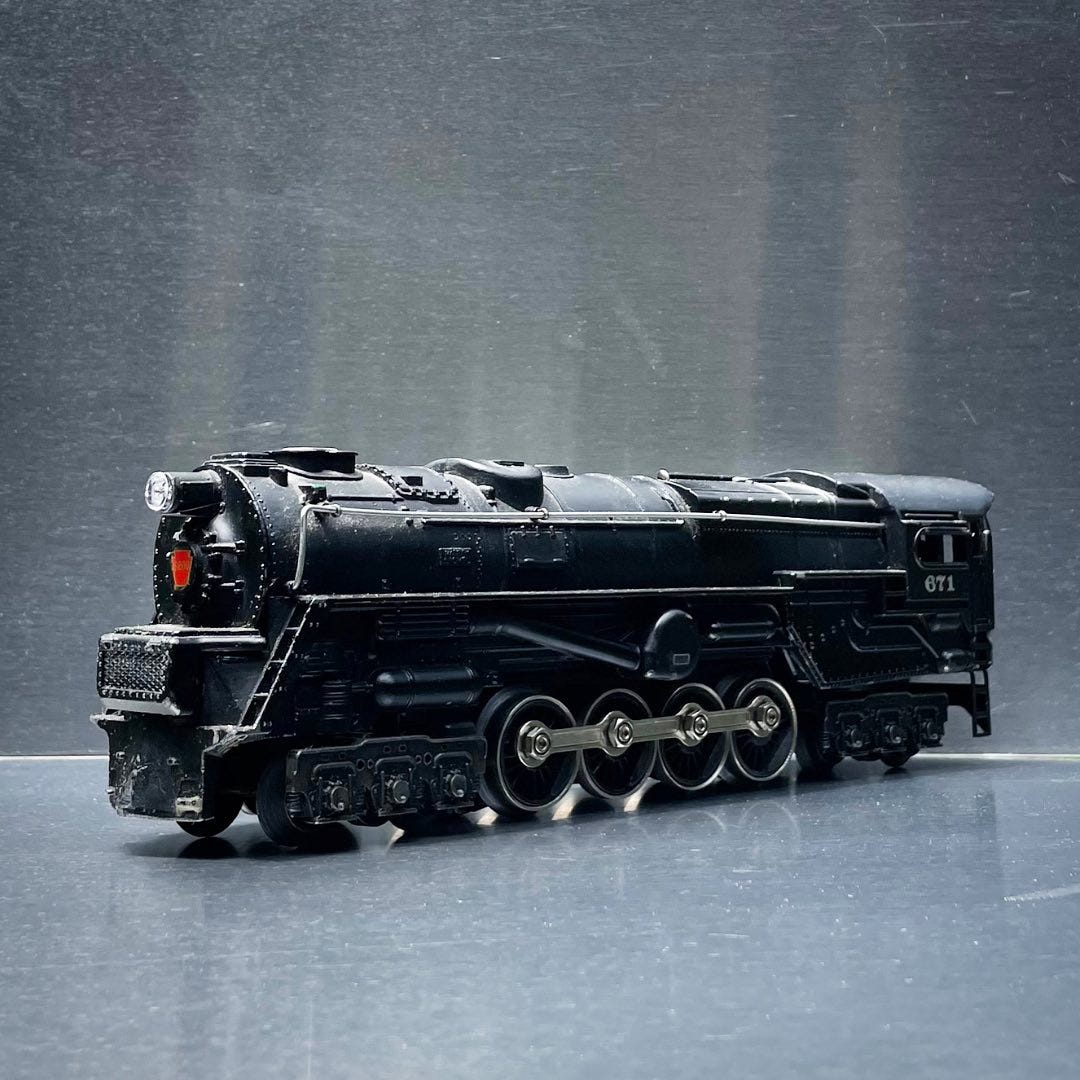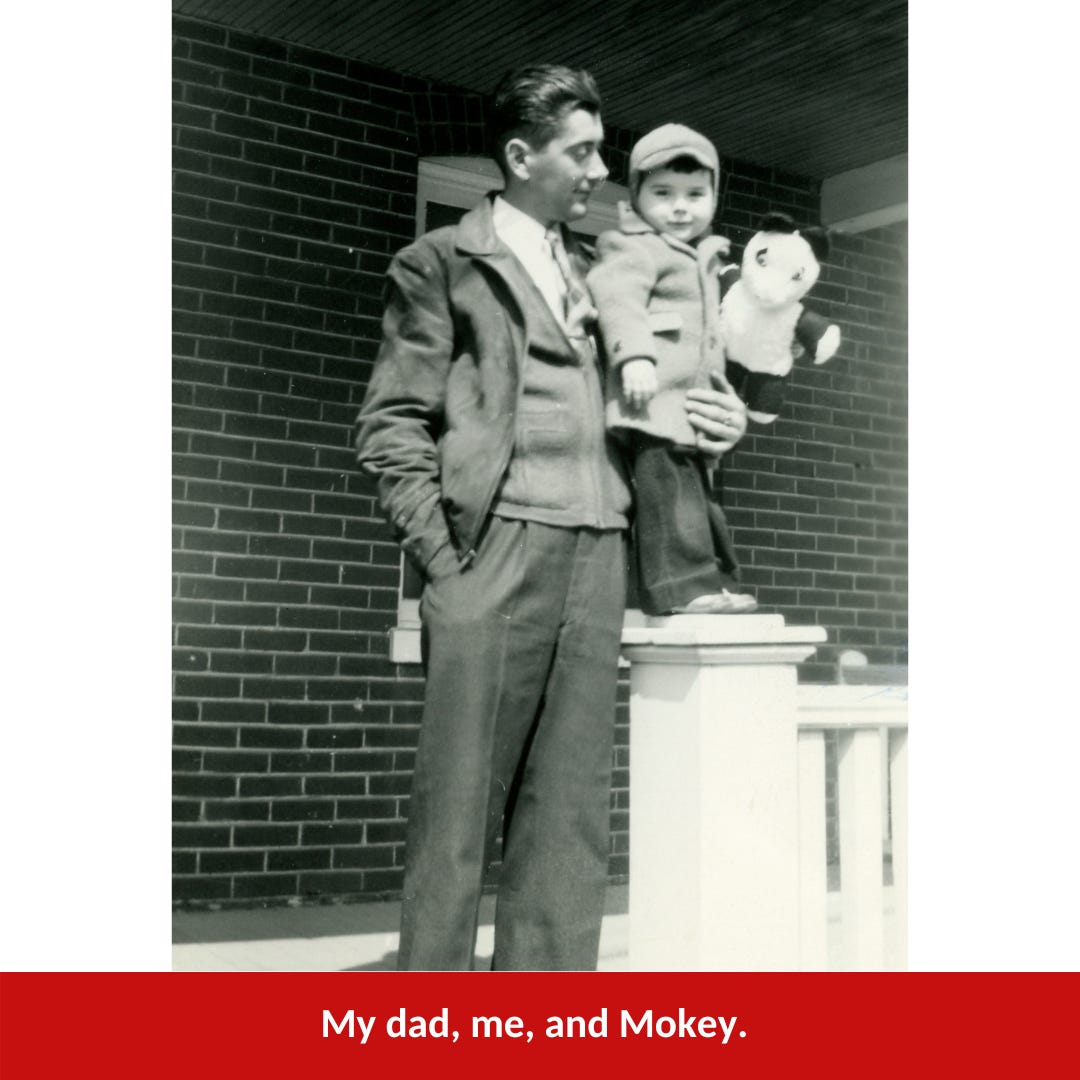THE LIONEL TRAIN
“Only later would I learn how much of a stretch it was for Dad to buy that train.”
My father was born in 1915, part of the “greatest generation.” He and my mother were high-school classmates and for a time had been next-door neighbors; they were married 64 years. All his working life, he was an independent businessman. As far as I know, he never worked a day as someone else’s employee. He was a breadman, a “bobtailer,” selling baked goods from his truck to a route of steady customers. Although he didn’t actually bake anything—he bought wholesale, then re-sold—people called him Baker.
In 1945, when I was 4, Dad was drafted into the Army. Germany had surrendered by then, but the army still needed men badly enough to call up a 29-year-old self-employed husband and father. He sent funny postcards from basic training in Louisiana (addressed to me, which I was very proud of). In high school he’d been known as a prankster, and he was the same in the army, once smearing smelly limburger cheese in a buddy’s helmet right before inspection. After basic training he was sent to Italy, where he drove a truck for the 351st Infantry Regiment, 88th Infantry Division. We couldn’t wait for him to come home.
Of course, when he did come home, he had no job waiting, so times were tough. (I recall going to meet him at Ft. Dix, running with my mom alongside his train to find him, then asking for his discharge button to be sure he was home for good.) We moved in with his parents while he strove to rebuild his business. Which he did. He worked hard. When I was 12 or so, I started helping him on Saturdays, his busiest day. As I grew older there were other things I'd rather have been doing, but I didn't begrudge him. He was a gentle, easygoing man, and I loved and respected him. So did his customers; when he retired, they gave him heartfelt notes and gifts.
But back to my story. Like many young boys in the 1940s, I had a model train that was set up on a plywood platform at Christmastime. Unfortunately, it was a Burlington Zephyr and I didn’t like it. It had a modernistic engine that I was afraid of because it looked mean. So the Christmas I was 5, not understanding that my parents had no money for things like toy trains, I asked for a new one.
That Christmas morning my parents and grandparents were still asleep when I snuck downstairs and saw it: a brand new Lionel O-gauge train on a great new platform! There were trees, houses, people, cars, even a tunnel! I honestly believe I must have been the happiest kid in Easton, PA. Only later would I learn how much of a stretch it was for Dad to buy that train. And how, shall we say, shocked my mom was when he brought it home. (She worked hard, too, by the way; her job at Binney & Smith, the makers of Crayola crayons, helped make it possible for me to go to college, for which I will be forever grateful.)
For most of the years between my teens and my sixties, the Lionel train was packed away in boxes that traveled from Pennsylvania to Michigan to New Jersey to Illinois as I moved around in my career. Then my granddaughter entered the picture. When she was six, in 2008, we built a wonderful new platform with my Lionel train as the centerpiece. It had a town, a cemetery, a hobo camp, a farmstand, and two tunnels. We built a mountain, an ice-skating pond, even a volcano. To think of the happy hours—some of the happiest of my life—we spent working on our railroad! And I owe it all to my dad.
My father loved hunting and fishing. He loved mackerel for breakfast (even though it stank up the house and the rest of us hated it). He could hardly stand to eat a cookie or donut that wasn’t dunked in milk, and if there wasn’t milk around, he’d go to the sink and turn on the water and dunk it right under the tap. He was a good guy and a great dad, and the train he gave me has created so many memories, spanning four generations and 75 years. It will be passed down to my granddaughter for enjoyment by future generations. So thanks, Dad, for your love and your determination to make your boy’s Christmas wish come true.
—Richard Way





